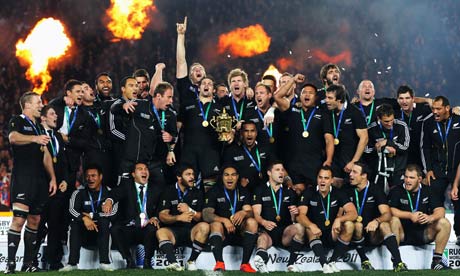
The All Blacks had a gruelling night, which may be no way to start a celebration of their victory. But they were made to look distinctly uncomfortable by France, who were so extraordinarily unrecognisable from their shambolic selves at all other stages of the tournament that we should have known all along and beyond any reasonable doubt that it was inevitable that they would play like this. They remain contrary to the depths of their gorgeously unfathomable rugby souls, and we should treasure every mutinous sneer and sardonic shrug as indications merely of beauty ahead.
There remains something, however, of an elephant in the room. The referee. Craig Joubert did not rise to the global occasion, only to the Kiwi event. He was not a 16th man out there, for the Eden Park crowd had already claimed that role, an expression of a nation's will that was not going to be denied.
But Joubert was not a curious investigator here. He seemed to take the view that this was not a crime scene but a house party and it would be rude to be too probing. In short, he refereed France but not the All Blacks. These seven weeks have not been the referees' finest.
Others, too, failed to rise to the occasion. Piri Weepu is the proudest All Black ever to have stuck out his chest and breathed fire at opponents that tower over him. But on his biggest night, he cracked. His kicking turned to sliced mush and nothing that was muttered through his lips as he ordered himself to follow the code of routine and rhythm had any connection with his swinging leg. Poor Piri was replaced after 50 minutes.
So, who did their bit for the cause? Step forward Stephen Donald, until a couple of weeks ago a whitebait fisherman on the banks of the Waikato, whiling away his time as last man on the outside-half reserve list before departing life as an All Black for English rugby with Bath.
Donald's All Black world may have been easier to leave behind than some others'. He had been panned for not really having the bottle for this international lark, somebody unreliable in times of stress. On he came after only 34 minutes, to replace little Aaron Cruden, fourth-choice taking over from third. Well, here's to Stephen Donald, master of his rugby destiny and holder of his nerve when it counted. Over went the penalty four minutes into the second half, the three‑pointer that meant France would have to score twice. He made a break in this final of all-consuming defence, and rolled the ball sweetly into touch when any sort of forward motion was cheered to the rafters.
New Zealand in normal times are generally sniffy about such mundane mechanics as shunting the ball into that area known as "anywhere but here", but they learned at this final to love a Donald gain of 10 metres, or a penalty awarded with two minutes to go. They appreciated with undying devotion the rumbling, time-eating mauls that in less stressed times they call European passion-killers.
Goodness, this was a game stripped to its fundamentals. The Maori Kaumatua (elders) who have blown their horns and drawn the players forward from the tunnel to the field have been pretty much undressed; now, in the grand final, their nation's rugby was similarly reduced layer by layer until the only thing left was bravery. France were the better team on the night, but the All Blacks never yielded. 8-7 sounds a miserable score, but this was gangster-movie gripping.
The biggest arms at work on the vice – not as in gangsters, but the worktop gripper – belonged to Thierry Dusautoir. A man-of-the-match award to a player on the losing side always suggests an exceptional performance, but Dusautoir has been out of this rugby world all through the French madness of the past seven weeks. One hundred metres gained on a night of progression by the centimetre, and 21 tackles made … it was one of the greatest performances we have seen in World Cup history.
And so it was that the All Blacks, the apostles of attacking rugby, edged their way over the winning line. Their only try came from a set-piece lineout: the unflinching Jerome Kaino to the uncomplicated loosehead, Tony Woodcock. Every last drop of their poetic outpouring was binned by the French, whose challenge was blunt: to win this you will have to do it the hard way.
And so they did. Without Dan Carter, the All Black trail was always going to be pot-holed, but nobody thought that Ma'a Nonu would be upended, that Israel Dagg would be hounded into kick-and-chase. That Piri would implode.
Richie McCaw was still there, refusing to limp on his gammy foot, refusing to be anywhere but perilously close to the tinder box, including being the owner of the hand and knee that knocked Morgan Parra out. He was the inspiration on a night of rearguard defiance and when he recovered from yet another bump with a couple of minutes to go, the roar of the 16th man was as loud as a penalty won.
It was ugly and it was beautiful, as contradictory as France throughout the World Cup. The All Blacks were the best and they won it at their worst. They deserved everything that came their way, the hard way.

